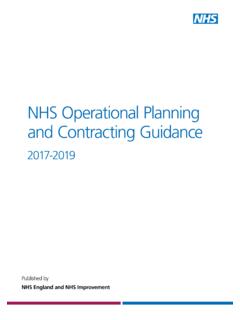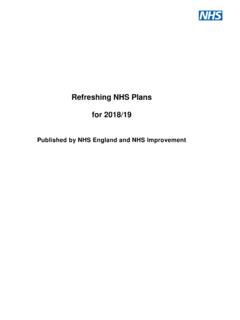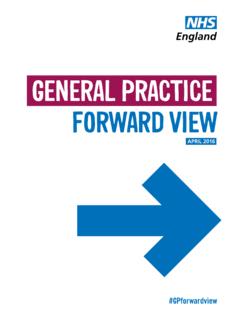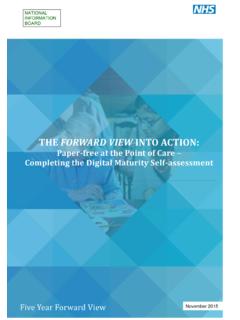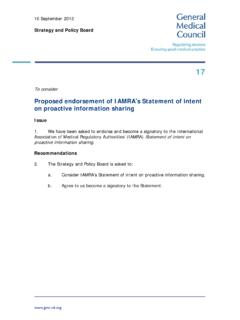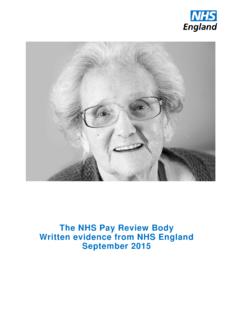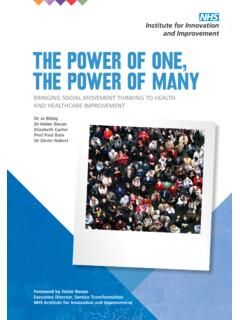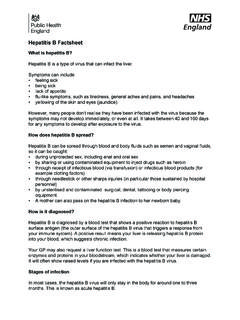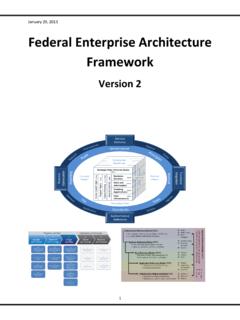Transcription of Commissioning Policy: Individual Funding Requests
1 Commissioning Policy: Individual Funding Requests NHS England INFORMATION READER BOX. Directorate Medical Operations and Information Specialised Commissioning Nursing Trans. & Corp. Ops. Commissioning Strategy Finance Publications Gateway Reference: 7313. Document Purpose Policy Document Name Commissioning Policy: Individual Funding Requests Author Specialised Commissioning Team Publication Date 17 November 2017. Target Audience CCG Clinical Leaders, Care Trust CEs, Foundation Trust CEs , Medical Directors, Directors of PH, Directors of Nursing, NHS England Regional Directors, NHS England Directors of Commissioning Operations, Directors of Finance, NHS Trust CEs, Healthcare professionals who wish to apply for treatments under the IFR policy. Additional Circulation #VALUE! List Description This publication is an update of the existing published policy on the management of Individual Funding Requests (IFRs) and outlines the conditions and the criteria which are used for decision making.
2 The processes for progression and consideration of IFR applications are outlined in the Standard Operating Procedures document. Cross Reference N/A. Superseded Docs Interim Commissioning Policy: Individual Funding Requests (if applicable) NHSCD/CP/03. Action Required None Timing / Deadlines None (if applicable). Contact Details for Specialised Commissioning Team further information NHS England Skipton House 80 London Road SE1 6LH. Document Status This is a controlled document. Whilst this document may be printed, the electronic version posted on the intranet is the controlled copy. Any printed copies of this document are not controlled. As a controlled document, this document should not be saved onto local or network drives but should always be accessed from the intranet. Page 2 of 25. Version number: 2. First published: April 2013. Revised publication: November 2017. Prepared by: NHS England Classification: OFFICIAL. This policy will apply to individuals eligible for NHS services in England only where NHS England is the responsible commissioner.
3 Page 3 of 25. Contents Contents .. 4. Equality Statement .. 5. Plain Language Summary .. 5. Individual Funding Requests Policy .. 8. Overview .. 8. Further explanation of the IFR criteria .. 9. Clinical Exceptionality .. 9. Clinical Exceptionality: non clinical and social factors .. 12. Clinical Effectiveness .. 13. A Good Use of NHS Resources .. 14. Experimental and Unproven 15. Funding for cases following a Clinical Trial .. 17. Information submitted to the NHS England IFR Team .. 18. Summary of the IFR process .. 19. Screening process for IFR Requests .. 19. Decisions on Funding .. 20. Review of the decision .. 22. Urgent decisions for Individual Funding Requests .. 23. Personal health budgets .. 25. Page 4 of 25. Equality Statement Promoting equality and addressing health inequalities are at the heart of NHS. England's values. Throughout the development of this policy statement, we have: Given due regard to the need to eliminate discrimination, harassment and victimisation, to advance equality of opportunity, and to foster good relations between people who share a relevant protected characteristic (as cited under the Equality Act 2010) and those who do not share it; and Given regard to the need to reduce inequalities between patients in access to, and outcomes from healthcare services and to ensure services are provided in an integrated way where this might reduce health inequalities.
4 Plain Language Summary Every year, the resources that NHS England receives are allocated to the services and treatments provided for patients. NHS England decides the treatments it will invest in on an annual basis through a prioritisation process (twice a year for specialised Commissioning treatments and services) so that, as far as possible, Funding is shared fairly and appropriately, considering the competing demands on NHS England's budget. When a new service or a change to a service is proposed, it would not be fair for that to bypass the prioritisation process and be funded without comparing it to other possibilities for investment. Because of this, NHS England's default position is that a new service will not be routinely commissioned until it has been assessed through the full service development process. Very occasionally a development is of such importance that there should be no delay in its introduction. If this is the case it is considered under the urgent development process - methods/.
5 On an Individual basis, there may be situations where a clinician believes that their patient's clinical situation is so different to other patients with the same condition that they should have their treatment paid for when other patients would not. In such cases, NHS clinicians can ask NHS England, on behalf of a patient, to fund a treatment which would not usually be provided by NHS England for that patient. This request is called an Individual Funding request (IFR). Funding for additional treatments outside the prioritisation process can only be done by reducing the Funding that is available for other established treatments. There is not an allocated separate budget to meet the costs of providing treatments agreed through the IFR process. It is because of this that very careful consideration is required before the decision is taken to fund a treatment for an Individual that is not usually available. When does this policy apply? IFRs can be made if: there is an NHS England clinical Commissioning policy, NICE Technology Appraisal (TA) guidance or Highly Specialised Technology (HST) Appraisal Page 5 of 25.
6 Guidance that governs whether to fund or not fund the treatment for the patient's condition, and a clinician can show that their patient is in a different clinical condition when compared to the typical patient population with the same condition; or the treatment is not normally funded and NHS England does not have a clinical Commissioning policy for the requested treatment for patients suffering from the same medical condition as the patient for which the treatment is being request , a policy does not yet exist, and the clinician considers the patient meets the criteria in the IFR policy. When will NHS England consider Funding in response to an IFR? NHS England will only provide Funding in response to an IFR, if it is satisfied that the case meets the following criteria: There is evidence that the patient presents with exceptional clinical circumstances1, that is: o There is an NHS England clinical Commissioning policy, NICE. Technology Appraisal (TA) guidance or Highly Specialised Technology (HST) Appraisal guidance that governs whether to fund or not fund the treatment for the patient's condition, and a clinician can show that their patient is in a different clinical condition when compared to the typical patient population with the same condition and (if relevant) at the same stage of progression, and because of that difference their patient is likely to receive material additional clinical benefit from treatment that would not be plausible for any typical patient.
7 OR. o There is not a relevant NHS England clinical Commissioning policy, NICE Technology Appraisal (TA) guidance or Highly Specialised Technology (HST) Appraisal guidance in place for the management of the patient's condition or combination of conditions, and the patient's clinical presentation is so unusual that they could not be considered to be part of a defined group of patients in the same or similar clinical circumstances for whom a service development should be undertaken. AND. There is a basis for considering that the requested treatment is likely to be clinically effective for this Individual patient;. AND. It is considered that the requested treatment is likely to be a good use of NHS. resources. 1. To note: In parts of this policy we refer to clinically exceptionality as shorthand for patients being different, as described here. Page 6 of 25. IFRs can be made for all NHS England's directly commissioned services. However, if there is evidence that other patients with the same condition could derive a similar type and degree of benefit from the treatment, the request is really for a new development in services for that group of patients.
8 In this case the clinician will need to consider proposing this treatment for development of a clinical policy. So that NHS. England can be fair to all patients, decisions on whether or not to fund this new development will be taken in line with NHS England's ethical In these circumstances, the request will not proceed through the IFR process. For specialised services, changes in routine Commissioning policies are considered through the service development route: services/service-development-policy-and- methods/. In this way NHS England can be sure that the opportunities for developments for patients across a wide range conditions can be considered in a fair and equitable way. 2. NHS England (2013) Commissioning Policy: Ethical framework for priority setting and resource allocation, Page 7 of 25. Individual Funding Requests Policy Overview 1. Every year, the resources NHS England receives are allocated to services and treatments that can be provided for patients, through development and review of Commissioning policies which apply robust criteria to the question of how the services and treatments should be funded.
9 Any additional calls on resources to fund an Individual 's treatment are, therefore, likely to mean reducing the Funding that is available elsewhere. The decision to fund a treatment that is not usually provided is only taken after very careful consideration. NHS England regards the matter of Funding for an Individual patient as an equity issue, in which it will consider whether it can justify Funding a particular patient when others from the same patient group are not being funded for the requested treatment. 2. Very occasionally, a clinician may think that their patient's clinical situation is so different to other patients with the same condition that it is appropriate that they should have different treatments to others. In such circumstances, clinicians, on behalf of their patient, may make an Individual Funding request (IFR) to NHS England for a treatment that is not routinely commissioned by NHS England. IFRs may be made for any of NHS England's directly commissioned services.
10 This route should only be used in exceptional circumstances and not as an alternative route to submitting a treatment for scrutiny through the Service Development process. 3. It is important to draw a distinction between the basis and approach in this IFR. policy and process, which is part of an overall NHS prioritisation framework, and the access schemes which may be periodically offered by commercial companies or the manufacturers of treatments to introduce their products to market in cases where there may be some clinical effect. Those access schemes are a matter for their promoters and do not establish any precedent for IFR Requests . When will NHS England consider Funding ? 4. NHS England will only provide Funding in response to an IFR, if it is satisfied that the case meets the following criteria: There is evidence that the patient presents with exceptional clinical circumstances, that is: o There is an NHS England clinical Commissioning policy, NICE.

